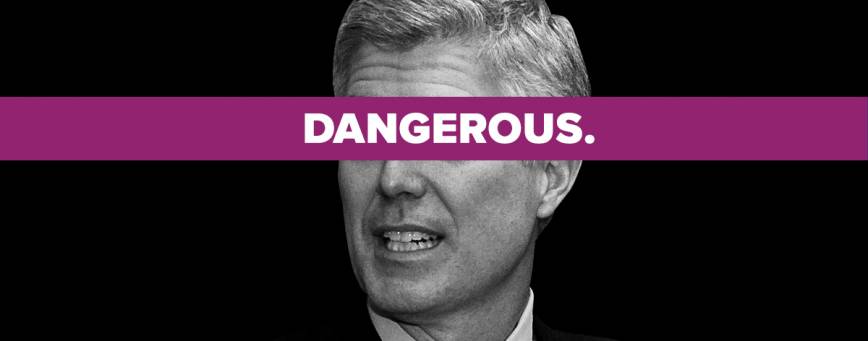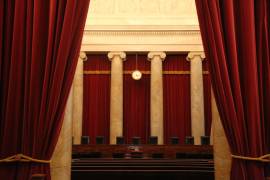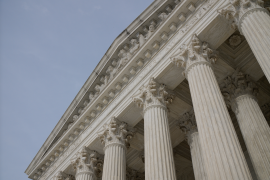After Donald Trump announced that he was considering nominating Neil Gorsuch, Judge of the 10th Circuit, to the U.S. Supreme Court, Lambda Legal’s Fair Courts Project embarked on a comprehensive review of his judicial record.
We considered the hundreds of opinions authored or co-authored by Judge Gorsuch in the 10th Circuit and analyzed other decisions in which he participated involving LGBT-identified and LGBT-affiliated parties, employment discrimination, reproductive rights, voting rights, criminal justice, rights of detainees, fair courts, or constitutional rights of equal protection, liberty, free speech, or religious exercise.
In previous statements, Trump promised to nominate a Supreme Court justice in the mold of Antonin Scalia. As we have noted in the past, Justice Scalia’s 30-year record on the Supreme Courts reflects a heated and harmful opposition to equal rights for LGBT people and people living with HIV, as well as to racial and reproductive justice. In an interview with the Christian Broadcasting Network, Trump stated that, “I think evangelicals, Christians will love my pick. And will be represented very fairly.”
Below are three instances where Judge Gorsuch’s views on civil rights issues are antithetical to Lambda Legal’s mission and are the basis for opposing his nomination.
Hobby Lobby. Judge Gorsuch has supported religious exemptions from laws based on “complicity”—the belief that adhering to the law makes the objector complicit in the allegedly sinful conduct of others.
Judge Gorsuch’s belief in complicity shaped his understanding of the law in Hobby Lobby, a case in which two for-profit corporations, privately owned by a Christian family, sought to be exempt from parts of the Affordable Care Act’s contraceptive coverage requirements. As he declared from the outset in his 10th Circuit opinion:
“All of us face the problem of complicity. All of us must answer for ourselves whether and to what degree we are willing to be involved in the wrongdoing of others. For some, religion provides an essential source of guidance both about what constitutes wrongful conduct and the degree to which those who assist others in committing wrongful conduct themselves bear moral culpability. . . . Understanding that is the key to understanding this case.”
Whereas the Supreme Court decision in Hobby Lobby made concerns about the impact on real people central, Judge Gorsuch did not address the harmful effects of denying access to reproductive healthcare on female employees and dependents. Instead, his sole concern was for the religious objectors who alleged that “ordering their companies to provide insurance coverage for drugs or devices whose use is inconsistent with their faith itself violates their faith, representing a degree of complicity their religion disallows.”
This is a vision of a society where religion prevails over law, and where the concerns of religious parties override the concerns of other citizens. In supporting this vision, Judge Gorsuch’s opinions open the door to all manner of assaults on the civil rights of ordinary citizens – including lesbians, gay men, bisexuals, and transgender people and everybody living with HIV.
In both its litigation and legislative work, Lambda Legal has fought vigorously to ensure religious liberty is preserved for all, and not used to harm others — especially in access to medical care.
Lambda Legal filed a friend-of-the-court brief in the 2014 Supreme Court case Burwell v. Hobby Lobby, urging the Court to reject arguments made by for-profit companies that they should be allowed to block their employees’ access to insurance coverage for contraception required by the Affordable Care Act because the companies’ owners claim birth control violates their religious beliefs.
We also filed a friend-of-the-court brief in the 2015 case King v. Burwell, highlighting the disparate impact that a challenge to the Affordable Care Act will have on people of color living with HIV in the states that have elected not to run their own health insurance exchange.
Druley v. Patton. Judge Gorsuch joined a 2015 opinion rejecting arguments made by a transgender woman who was incarcerated that the Oklahoma Department of Corrections had violated her constitutional rights by denying her medically necessary hormone treatment and her request to wear feminine clothing.
“To date, this court has not held that a transsexual plaintiff is a member of a protected suspect class for purposes of Equal Protection claims. . . . Ms. Druley did not allege any facts suggesting the ODOC defendants' decisions concerning her clothing or housing do not bear a rational relation to a legitimate state purpose. Thus, she has not demonstrated a likelihood of success on her Equal Protection claims.”
Liberals’N’Lawsuits. In 2005, Judge Gorsuch wrote an essay, “Liberals’N’Lawsuits,” in which he expressed disapproval of civil rights impact litigation. He wrote in part:
“American liberals have become addicted to the courtroom, relying on judges and lawyers rather than elected leaders and the ballot box, as the primary means of effecting their social agenda on everything from gay marriage to assisted suicide to the use of vouchers for private-school education. This overweening addiction to the courtroom as the place to debate social policy is bad for the country and bad for the judiciary.”
It is telling that Judge Gorsuch saves his criticism for “American liberals,” even as the U.S. Supreme Court routinely hears conservative challenges to constitutionally protected rights.
Lambda Legal’s mission is to achieve full recognition of the civil rights of LGBT people and everyone living with HIV. We are entitled to equal protection, liberty and dignity under the law. And we will continue to challenge all barriers in our path to equality – including in courts.





